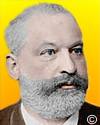
On 6 Feb 1886, the German chemist Clemens Winkler first isolated the new element germanium. Yet a single sentence like that does not do justice to the months of dogged work needed to release the elusive element from a mineral sample. Then its chemical behaviour needs to be documented, and its physical characteristics measured. To have a better idea about what's involved in the discovery of a new element, read Winkler and the Discovery of Germanium.

On 6 Feb 1913, Mary Leakey was born (née Nicol), who became a member of a single family that is one of the most important and effective forces in the age-old effort to trace the human family to its origins. Today's book pick is: Ancestral Passions: The Leakey Family and the Quest for Humankind's Beginnings, by Virginia Morell. This book reveals the competing bands of modern anthropologists competing over limited paleontological and conceptual resources of publication, prestige, and power, much like ancient hominid bands competing for caves, copulations, and carcasses.
It is available from Amazon, typically about New from $15.00. Used from $1.54. (As of earlier time of writing - subject to change.)
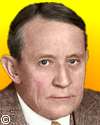 | Life became a science when interest shifted from the dissection of dead bodies to the study of action in living beings and the nature of the environment they live in. |
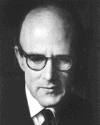 | I rarely plan my research; it plans me. |
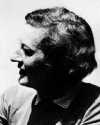 | There were details like clothing, hair styles and the fragile objects that hardly ever survive for the archaeologist—musical instruments, bows and arrows, and body ornaments depicted as they were worn. … No amounts of stone and bone could yield the kinds of information that the paintings gave so freely |
| Before you look at today's web page, see if you can answer some of these questions about the events that happened on this day. Some of the names are very familiar. Others will likely stump you. Tickle your curiosity with these questions, then check your answers on today's web page. | |
| Births | |
 | Mary Leakey, an English paleoanthropologist, born 6 Feb 1913, made several of the most important fossil finds concerning the origins of man, subsequently interpreted and publicized by her husband. After his death, she continued making discoveries, including three trails of fossilised hominid footprints 3.6 million years old, which she discovered at Laetoli in Tanzania (1978-9) showing man's ancestors were walking upright at a much earlier period than previously believed. Can you name her husband? |
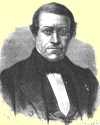 | Sir Charles Wheatstone, born 6 Feb 1802, though he did not invent the Wheatstone Bridge circuit, has been remembered for popularizing its use. Samuel Hunter Christie, came up with the idea of the bridge circuit, but Wheatstone set the precedent for using it in the way in which it has been most commonly used. What is commonly and accurately measured with a Wheatstone Bridge? |
| Deaths | |
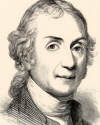 | Joseph Priestley (1733-1804) was an English clergyman, political theorist, and physical scientist whose work contributed to advances in liberal political and religious thought. He also conducted experimental science whose discoveries included sulphur dioxide, silicon fluoride and ammonia and among his inventions was the pneumatic trough. For the discovery of which element is he most remembered? |
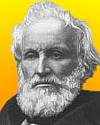 | Frederic Tudor (1783-1864) was an American businessman who overcame initial huge losses to eventually make a profit from exporting water from New England ponds. His first delivery went from Boston to Martinique (1806). By 1833, he was shipping to Calcutta, India. What was special about the water he exported? |
| Events | |
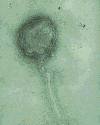 | On 6 Feb of a certain year, swine flu claimed the life of 19-year-old Pvt. David Lewis. This influenza had not seen since the Spanish flu of 1918-19. The next month, following advice from medical experts, the President called for the mass inoculation of the entire U.S. population. No comparable vaccination effort had ever been attempted in the U.S. before. In which decade did this swine flu mass inoculation take place? |
 | On 6 Feb 1971, near the end of the second moonwalk, and just before entering the lunar module for the last time, Alan Shepard engaged in a recreational activity common on the Earth, but was the first time on the moon. What was this recreational activity by Shepard on the Moon? |
Fast answers for the previous newsletter for February 5: his 9-yr-old son's tricycle • Maxim machine gun • study of landforms • decade including the year 1901 • Mariner 10 • decade including the year 1897 • the decade including the year 1974.
 If you enjoy this newsletter, the website, or wish to offer encouragement or ideas, please send feedback by using your mail reader Reply button.
If you enjoy this newsletter, the website, or wish to offer encouragement or ideas, please send feedback by using your mail reader Reply button. Your click on a Facebook, StumbleUpon, or other social button on the site webpages is also a welcome sign of appreciation. Thank you for using them.
© This newsletter is copyright 2020 by todayinsci.com. Please respect the Webmaster's wishes and do not put copies online of the Newsletter — or any Today in Science History webpage. (If you already have done so, please remove them. Thank you.) Offline use in education is encouraged such as a printout on a bulletin board, or projected for classroom viewing. Online, descriptive links to our pages are welcomed, as these will provide a reader with the most recent revisions, additions and/or corrections of a webpage. For any other copyright questions, please contact the Webmaster by using your mail reader Reply button.
--
If you do not want to receive any more newsletters, Unsubscribe
To update your preferences and to unsubscribe visit this link
Executive Real Estate Business Class
-
"It was like a man with wings. It wasn't like anything you'd see on TV or in a monster movie." ...
About the publisher
Search This Blog
Blog Archive
-
▼
2021
(585)
-
▼
February
(72)
- Mary Seacole | The Spitfire | George Washington
- On This Day for February 28 - Olof Palme assassina...
- On This Day for February 27 - Chile struck by eart...
- On This Day for February 26 - Napoleon's escape fr...
- On This Day for February 25 - Ousting of Marcos in...
- Demystified: How Do Penguins Tell Each Other Apart?
- On This Day for February 24 - U.S. President Andre...
- On This Day for February 23 - Alamo besieged by Sa...
- On This Day for February 22 - Cloning of Dolly, Ge...
- Your essential guide to the Tudors | LGBT+ history...
- On This Day for February 21 - Malcolm X assassinat...
- On This Day in History by OnThisDay.com: You are n...
- February 21: The 1st Romanov Tsar, the 1st Locomot...
- On This Day for February 20 - John Glenn's orbit o...
- On This Day for February 19 - Iwo Jima invaded by ...
- 🎉 Ready for 30% Off Kids' Memberships?
- On This Day for February 18 - Pluto discovered by ...
- Newsletter for Thursday 18 February.
- Demystified: Why Does Salt Melt Ice?
- On This Day for February 17 - Vietnam invaded by C...
- Newsletter for Wednesday 17 February.
- On This Day for February 16 - Power in Cuba seized...
- Newsletter for Tuesday 16 February.
- On This Day for February 15 - USS Maine destroyed,...
- Newsletter for Monday 15 February.
- February 15: The King of Persia, the Human Genome ...
- Who was Saint Valentine?
- On This Day for February 14 - Fatwa issued against...
- Newsletter for Sunday 14 February.
- February 14: Battle of Cape St Vincent, the Teleph...
- On This Day for February 13 - William and Mary cro...
- Newsletter for Saturday 13 February.
- February 13: Baghdad falls to the Mongols, the Bil...
- On This Day for February 12 - Chile's independence...
- Newsletter for Friday 12 February.
- February 12: The Qing Dynasty Ends, The Senate Acq...
- Demystified: Why Do We Say “A Pair of Pants”?
- On This Day for February 11 - St. Bernadette's fir...
- Newsletter for Thursday 11 February.
- February 11: Margaret Thatcher's Rise to Power, Ne...
- Watch ‘Tuskegee Airmen: Legacy of Courage’
- 🇺🇸💰Your Presidents' Day Exclusive Bonus!
- On This Day for February 10 - Kasparov-versus-comp...
- Newsletter for Wednesday 10 February.
- February 10: End of the French-Indian War, HMS Dre...
- All-New Tonight: 'The Food That Built America' Sne...
- On This Day for February 9 - Calcutta restored to ...
- Newsletter for Tuesday 9 February.
- February 9: Massachusetts Rebels, the Battle of Gu...
- On This Day for February 8 - Mary, Queen of Scots,...
- Newsletter for Monday 8 February.
- February 8: Mary Stuart is Decapitated, Napoleon L...
- What did Mary Tudor think of Anne Boleyn and her o...
- On This Day for February 7 - British Invasion laun...
- Newsletter for Sunday 7 February.
- February 7: The 1st English Prince of Wales, the M...
- Newsletter for Saturday 6 February.
- On This Day for February 6 - Accession of Elizabet...
- February 6: Maximilian I and Elizabeth II Ascend t...
- Black History Month: The Tuskegee Airmen Documenta...
- On This Day for February 5 - Punic Wars ended, Han...
- February 5: Congo Taken as a Personal Possession a...
- On This Day for February 4 - Yalta Conference open...
- February 4: The Chinese Song Dynasty, World's Olde...
- Serving Up an All-New Season
- On This Day for February 3 - Fifteenth Amendment t...
- February 3: The Naval Battle of Diu, Universal Suf...
- On This Day for February 2 - Ban on African Nation...
- February 2: New Amsterdam Grows Up, the US Pays Me...
- On This Day for February 1 - Space shuttle Columbi...
- Newsletter for Monday 1 February.
- February 1: Black History Month Starts and a Day o...
-
▼
February
(72)
-
Blogroll
-
About
HistoryFact










0 comments:
Post a Comment